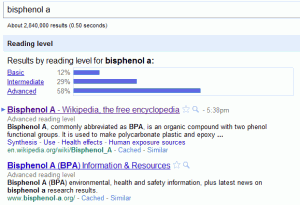Google’s Matt Cutts on 28th of January announced the launch of a new algorithm intended to better detect and reduce spam in Google’s search results and lower the rankings of scraper sites and sites with little original content.
This has been then recently followed by the Google Panda update (or Farmer update if you prefer) that ultimately targeted those site whose link strategy it is not … ehmmm “properly the best”.
If I would like to use the first two paragraphs only, I bet that I could spend the next three hours disclosing on the pro and the cons of each of those updates, regardless they correctly targeted the proper web site and if they can be further optimized.
However, considering the sunny day outside in Letchworth (Hertfordshire), I don’t want to absolutely consider the option to stay in.
So I will try to make it a long story short. Better. I will talk about a quite new interesting feature revealed a couple of months ago from Alex Chitu, about the reading level of the results available in the SERP, which it seems a bit unnoticed.
Google now classifies the complexity of a text
Google is now able to classify search results based on the complexity of the text. If you enable this feature, you can restrict the results to “basic” pages, “intermediate” pages and “advanced” pages.
Right now, this feature is only available for English web pages, but Google doesn’t mention if it uses the Flesch–Kincaid readability tests or something different.
Also Google didn’t mention whether or not they are working on something similar for other languages (at least the most common European languages).
If Google will follow the usual pattern, I guess that in about six months time, Alex will come back to us announcing the feature extension.
Why document readability may be important for SEO
It is important to notice that so far anybody mentioned readability is part of Google algorithm; however, when talking about quality of content, it is pretty obvious – at least for me – thinking also to its readability. Therefore, having a flowing and quite decent-long document it is becoming one of the many signals Google uses to assess a page.
After all, it’s quite unusual for Google engineers to invest times in something that may be not have some other benefit in their search engine (well there are some exceptions like Google Buzz or Google +1, but that’s another story).
So let’s stay tuned to see what’s happening on the widest used search engine, and – as usual – if you want to share your thoughts, feel free to drop a comment.


